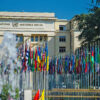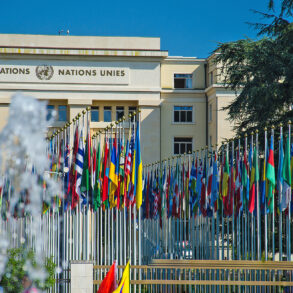It seemed like a symbolic high-point to the economic summit in Davos. Sixteen-year-old Greta Thunberg, a Swede, used the Swiss Alpine forum to warn delegates of imminent climate catastrophe and to issue a collective, revolutionary call: you have to change your lives! The environmental activist became a media star overnight, although the reality of her appearance was somewhat more low key. When Greta addressed the summit, most of the captains of business and politicians were long gone. She was speaking in a side room in front of fifty selected people. But her call to the youth of the world shot around the globe. Greta’s personality became for some a symbol of youthful hope, challenging elites, while for others her contribution was merely an expression of a new ideology.
The personal imperative, “You must change your life”, which Greta expressed to a wide audience, was once made famous by Rainer Maria Rilke. The poet was inspired by a torso of Apollo, leading him to write one of the most famous poems in German literature. “There is no place that does not see you. You must change your life,” declare its last two lines. In his eponymous book, Peter Sloterdijk not only interprets the poem, he aptly observes that modern, liberal man does not really like to accept commands that intervene from the outside into his private autonomy, be it from religion or the state.
The obvious ecological crisis is an exception to this, and many people instinctively accept that they cannot continue as they have been and will have to change their lives. In this sense, Greta expressed something which a whole youthful generation has long internalised and integrated into its superego. Parents are now surprised to be interrogated by their children at the dinner table about their annual emissions balance and eating habits.
These days, a sense of having to save the planet has become a typically German mood. Chancellor Angela Merkel clearly felt that way at the Munich Security Conference. Paradoxically, the Chancellor was listening to dozens of generals and representatives of the arms industry, busy building up new methods of atomic destruction. The European project of the rationalisation, economisation and scientification of all life’s processes keeps being confronted with the irrational possibility of its own demise. But the Chancellor’s idea of rescue is not based on systematic doubt, it rests more on the idea of creating better and better conditions using more and more technology and capital.
In his book ‘The Ticklish Subject’, Slavoj Zizek doubts this approach, especially in view of the ecological crisis: “The moment we reduce it to disturbances provoked by our excessive technological exploitation of nature, we silently already surmise that the solution is to rely again on technological innovations: new ‘green’ technology, more efficient and global in its control of natural processes and human resources…”
In political Germany, three broader descriptions of fundamental fears have for some time been competing, originating in the consequences of the climate, immigrant and financial structure crises. Society is divided into two camps, especially by the climate and immigrant crises. For those advocating a strong nation state, the immigrant crisis justifies their ultimate fears of globalisation, while globalists believe that surmounting the climate crisis is beyond the nation state, which is why global institutions should be strengthened. This places both groups in an implacable stalemate.
Of course, both positions are based on a certain kind of conviction which cannot be fully explained by rational lines of reasoning. Slavoj Zizek repeatedly argues that it is in fact ideologies that now dominate our democratic existence. “What is crucial to ideology,” explains Zizek, “is not that it is an illusion that masks the real state of things, but that it consists of an (unconscious) fantasy that structures our own social reality.”
Zizek believes that political convictions necessarily invoke “sublime objects of ideology” in order to establish their own absolutely superior positions. Kant himself defined the sublime as “that which is great per se”, thus suiting it as a substitute for God. Today these sublime objects are terms like “Nature” or “the People”, which in the end remain philosophically indeterminate in their substance, but which are deemed especially worthy of protection – which one depending on one’s ideological position. In extreme cases, this can mean justifying an ecodictatorship or a nationalistic state as a legitimate entity for protecting the threatened object.
These opposites are now amplified by the game of media. The use of certain phrases such as “flood of asylum seekers” and “climate catastrophe” structure the discourse and evoke certain chains of association. In a recent German state television report, this mechanism was officially designated as the “framing” effect and its impact explained as follows: “Contrary to current myth, people do not decide for or against things pure rationally or on the basis of objective considerations, because there is no objective, fact-based and rational thinking, at least not in the form suggested by Enlightenment thought.”
Man’s flaw of never quite understanding, explaining or recognising the complexities of reality makes him susceptible to ideology and fantasies formed in his own imagination. They fill any omissions in his own line of reasoned argumentation. Politically they manifest in dangerous social tensions in which diverging convictions challenge one another, often presented with a bearing of absolute superiority. In this arrangement, ideology is always considered ‘Other’. Furthermore, in certain camps, because of the prevailing mood of catastrophe, an alarming conviction is spreading that democracy is unable to respond quickly or radically enough to ecological or social challenges. Thus arises the temptation to invoke hard political solutions in the face of an imagined, imminent demise, even if these are to the detriment of the majority of the population.
So how should Muslims handle these new forms of ideology? The fundamental difference is that the believer places the Creator, not man, at the centre. It is natural that the Revelation will play a role, and Muslims will look to it for clues about how to surmount the current crises. Indeed, our traditions contain countless commands to protect creation and exercise solidarity. The Quran contains firm orders to build a moderate economy, permit trade and forbid ‘riba’, along with rational maxims pertaining to economic law.
One can of course imagine the objections which thinkers like Slavoj Zizek might raise. Will not the invocation of sublime objects of religion lead to a totalitarian theocracy? A brief survey of the fascistic episode of the “Islamic State” gives this objection a certain weight. But Zizek’s discourse on ideology also posits that the possibility and danger of ideologisation affects any social group that seeks to sustain its existence on earth.
So what is crucial for us as Muslims is to understand Islam itself not as a political ideology, but as a practice of moderation. And to that one might add a certain gelassene Geisteshaltung, a serene and composed state of mind, which at its core is neither a dialectic against others, nor a mood of catastrophe. It recalls the Prophetic wisdom that you should continue to plant a tree, even if demise is imminent.











